|
|
 |
August 2018 |
|
|
|
|
|
|
|
|
Distinguished neuroscientist Kay Tye to join
Salk Institute
|
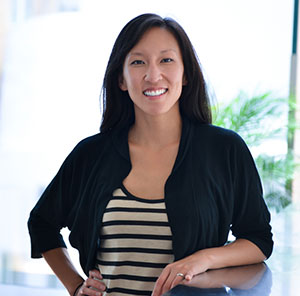
The Salk Institute has announced that distinguished neuroscientist Kay Tye will join the Salk faculty in January 2019 as a full professor. She is currently an associate professor in the Department of Brain and Cognitive Sciences, Picower Institute for Learning and Memory, at the Massachusetts Institute of Technology (MIT).
"Kay is one of the world's leading neuroscientists, having made trailblazing discoveries and earned a reputation for scientific boldness, collaboration and a strong approach to mentoring the next generation of scientists," says Salk President Rusty Gage. "And, with Salk at the forefront of emerging efforts to better understand the mysteries of the brain, Kay's approach will bring new and important opportunities for fundamental discoveries."
Tye focuses on a wide variety of cutting-edge technologies and approaches to better understand the brain's circuitry underlying emotion and motivation. Her discoveries are helping to pave the way for more targeted and efficient treatments for brain disorders, such as addiction-related behaviors, attention-deficit disorder (ADD), anxiety and depression. She has also examined how emotional states such as increased anxiety might increase the propensity for substance abuse by facilitating long-term changes associated with reward-related learning.
|
|
|
| Salk Institute receives $2 million for cancer research initiative |
|
The Salk Institute announced a $2 million gift in support of its new
Conquering Cancer Initiative from its current Board of Trustees Chair, Dan Lewis, and his wife, Martina Lewis. The funds will be used to advance the Salk Cancer Center's highest research priorities, including new investigations into five of the deadliest cancers: lung, pancreatic, brain (glioblastoma), ovarian and triple-negative breast.
|
 |
|
|
|
|
Salk scientists find that common dietary elements cure lethal infections, eliminating the need for antibiotics
|
|
|
The lab of Associate Professor
Janelle Ayres reports that giving mice dietary iron supplements enabled them to survive a normally lethal bacterial infection and resulted in later generations of those bacteria being less virulent. The approach, which appeared in the journal
Cell, demonstrates in preclinical studies that non-antibiotic-based strategies
---such as nutritional interventions
---can shift the relationship between the patient and pathogens away from antagonism and toward cooperation.
|
|
|
|
|
| Salk researchers identify genetic characteristics of fetal stem cells that may lead to breast cancer later in life |
|
 |
Professor
Geoffrey Wahl's team has uncovered a reason for the uncanny likeness between cells in the most malignant cancers and the embryonic cells of the organ in which the cancer originated: cells in human basal-like breast cancers share features with the embryonic mammary (breast) stem cells that are the progenitors of all cell types in the mammary gland (of a mouse). The insights leading to this conclusion were published in the journal
Cell Reports.
|
|
|
|
| Salk study in mice finds microbiome-induced changes in liver may influence diabetes |
A new study led by Salk Professor
Satchidananda Panda has found that mice that have their microbiomes depleted with antibiotics have decreased levels of glucose in their blood and better insulin sensitivity. The research has implications for understanding the role of the microbiome in diabetes. It also could lead to better insight into the side effects seen in people who are being treated with high levels of antibiotics. The study appeared in the journal
Nature Communications.
|
|
|
|
Researchers discover key to mass-producing beneficial plant compounds
|
|
|
Salk Institute researchers in
Joe Noel's lab, together with Purdue University scientists, have discovered the switch in plants that turns off production of terpenoids
---carbon-rich compounds that play roles in plant physiology and are used by humans in everything from fragrances and flavorings to biofuels and pharmaceuticals. The findings were reported in the journal
Nature Plants.
|
|
|
|
|
| Salk scientists show that cells adapt to brief stressors by boosting antioxidants and energy production longer term |
|
 |
Research led by Profesor
Gerald Shadel suggests why, at a cellular level the expression "what doesn't kill you makes you stronger" might be true. His team found that brief exposures to stressors can be beneficial by prompting the cell to trigger sustained production of antioxidants, molecules that help get rid of toxic cellular buildup related to normal metabolism. The research, which appeared in
Cell Metabolism, could lead to new approaches to counter the cellular effects of aging.
|
|
|
|
| Widespread connections among neurons help the brain distinguish smells |
|
Compared to many parts of the brain, the piriform cortex
---which lets animals and humans process information about smells
---looks like a messy jumble of connections between cells called neurons. In work published in the
Journal of Comparative Neurology, the lab of Distinguished Professor Emeritus
Charles Stevens illuminated how the randomness of the piriform cortex is actually critical to how the brain distinguishes between similar odors.
|
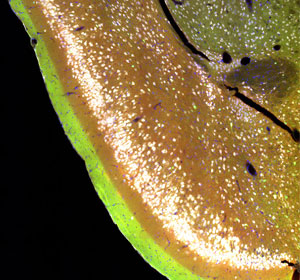 |
|
|
|
|
|
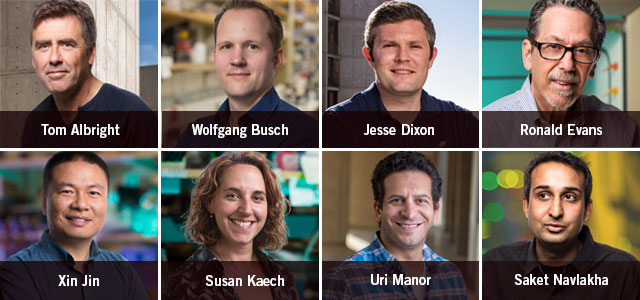
Salk's Innovation Grants program, launched in 2006 from the forward-thinking minds of then-Board Chair Irwin Jacobs and his wife, Joan, embodies the vision and spirit of the Institute that bears Jonas Salk's name. The Innovation Grants Program is designed to fund out-of-the-box ideas that hold significant promise but may not yet have the track record to attract attention from more traditional funding sources.
Congratulations to The Rose Hills Foundation and Joan and Irwin Jacobs July 2018 Innovation Grants awardee:
- Associate Professor
Xin Jin, Molecular Neurobiology Laboratory
Congratulations to the Joan and Irwin Jacobs July 2018 Innovation Grants awardees:
|
|
|
| New edition of Jonathan Salk book released |
|
|
Jonathan Salk has released a new edition of his 1982 book, co-authored with his father, Jonas Salk. Titled
A New Reality: Human Evolution for a Sustainable Future, the volume draws from many of the writings of the elder Salk to provide a "startling, fresh new message of understanding, perspective and hope for today's tense, rapid-fire, kaleidoscopically changing world." Updated to reflect new social and scientific realities that have emerged since the release of the first edition, the book is available on Amazon.
|
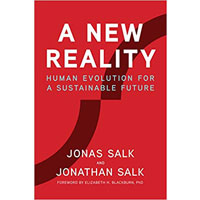 |
|
|
|
| Symphony at Salk champion Debra Turner featured in Giving Back Magazine's "Feel Good Friday" |
|
|
Symphony at Salk Zenith Sponsor, and the presenting sponsor of the San Diego Symphony, Debra Turner was recently featured in a fun Q&A with
Giving Back Magazine in their weekly "Feel Good Friday" article. The article offers an opportunity to learn more about one of Symphony's most influential partners. For example, did you know that Turner has more than 2,500 skydiving jumps to her credit? Read the whole piece to find out why she no longer skydives.
|
|
|
|
Symphony at Salk - August 25, 2018
|
|
|
|
SOLD OUT
For nearly a quarter century, Symphony at Salk has been an unparalleled experience where attendees can hear a symphony under the stars in Salk's iconic courtyard. This year's event continues that tradition with the Tony Award-winning star of
Hamilton, Leslie Odom, Jr.
|
|
|
|
Salk gets Back to Basics on September 12
|
|
|
On Wednesday, September 12, join us from 3:00-5:00 p.m. to hear from Salk Professor
Satchin Panda on "The Circadian Theory of Health." Panda proposes that this theory of health can revolutionize healthcare and can give us decades of disease-free life. He will discuss this theory, how working with the circadian rhythm actually promotes better health and how his research at the Salk Institute is being used to prevent and cure chronic diseases. The event is free but you must RSVP.
|
|
|
|
|

Salk Professor
Satchin Panda's new book,
The Circadian Code, was covered in
The New York Times. He makes the case for a way of managing diet referred to as "time-restricted feeding," suggesting that by managing when we eat, people can have a more profound impact on their weight and overall health than by focusing on what they eat. The book is available for purchase on Amazon.
|
|
|
|
Salk Women & Science: Design and Discovery set for October 10
|
|
|
|
The next Salk Women & Science: Design and Discovery showcase is set to take place on October 10, 2018. Following on the heels of a wildly successful event last year that featured a unique blending of science and fashion, this year's showcase will highlight the beautiful microscopy images created in Salk labs in a photographic exposition. Invitations will be going out soon.
|
|
|
|
|
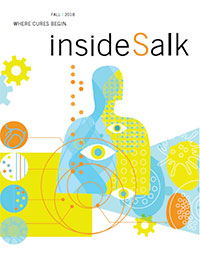 |
The fall issue of
Inside Salk lands online and in mailboxes soon, highlighting pioneering work in immunology, an interview with Salk President
Rusty Gage and other discoveries and news from around the Institute.
Interested in getting on our mailing list to receive the print version of Inside Salk?
|
|
|
|
| Salk science "Wahl-paper" images |
|
Looking for a unique background image for your computer, iPad or phone?
This month's "Wahl-paper" image comes from a recent
press release from Salk scientists in
Geoffrey Wahl's lab who have uncovered a reason for the similarities between cells in the most malignant cancers and the embryonic cells of the organ in which the cancer originated.
|
| |
|
|
|
|
|
|
|
|
|
|
|
|